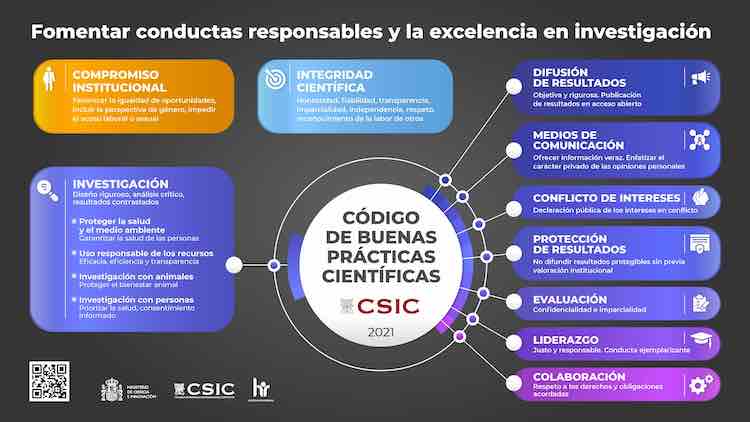Integrity and Good Practices in Research
CNB
Ethics in Research
Ethics in research requires the practice of science to be carried out in accordance with ethical principles that ensure the advancement of knowledge, the understanding and improvement of the human condition and the progress of society. It focus on the consideration of the ethical aspects of research, its nature and aims (respect for the dignity of human beings, the autonomy of their will, protection of their data – privacy, confidentiality -, animal welfare and preservation of the environment).
Given the growing importance of the ethical implications of scientific work, as well as the diverse legislation developed in this field, ethics committees play a fundamental role, helping to ensure that research by the scientific community is carried out in accordance with the regulations in force and with absolute respect for bioethical and biosafety principles, commitments and requirements in general.
More information on the CSIC website

Scientific Good Practices
Scientific good practices is the set of individual and organisational actions and behaviours based on the fundamental values of science that express the principles and responsibilities of scientific integrity. Good scientific practice underpins responsible conduct in research.
The CSIC has a Code of Good Scientific Practice drawn up by the CSIC Ethics Committee with the participation of the institution’s staff. This Code has defined and developed a series of principles, commitments, declarations and recommendations applicable to any type of research, which are intended to guide the exercise and development of the research activity of the institution’s staff. As part of the institution, the CNB adheres to this code.
El CSIC, junto a CRUE Universidades Españolas y la COSCE han suscrito a día 2 de Diciembre de 2015 la Declaración Nacional Sobre Integridad Científica. En este texto se establecen claves como la honestidad, la objetividad y la imparcialidad para todas las disciplinas científicas. As part of the CSIC, the CNB adheres to this declaration
Deviations from good scientific practices.
In the development of scientific research there is a whole series of behaviours that are far removed from rigorous and responsible praxis, which can be categorised according to the effects and consequences that derive from them. The most serious violation of good scientific practice is fabrication and falsification, although it is commonly accepted that research misconduct – scientific malpractice – also includes plagiarism. In addition to fabrication, falsification and plagiarism, there are other unacceptable practices which, without falsifying or misrepresenting the recording of data and results, constitute irresponsible and therefore undesirable behaviour.
In addition, the CNB is committed to following the CSIC Conflict of Interest Manual.
Conflicts of interest arise in situations where the proper discharge of public professional duties and responsibilities, professional judgement or judgement, or the fulfilment of the institutional mission may be unduly affected by private or secondary interests. Conflicts of interest should NOT be identified with research malpractice, but if not properly managed they represent a clear threat to scientific integrity.
CSIC Documents
HRS4R Strategy
The “HRS4R” strategy is a European Commission initiative that supports research institutions and funding organisations in implementing the European Charter for Researchers and theCode of Conduct for the Recruitment of Researchers (C&C) for the recruitment of researchers in their policies and practices.
The European Commission recognises with the logo “HR Excellence in Research” institutions that make progress in aligning their human resources policies with the 40 principles of the Charter and the Code, on the basis of a customised human resources action plan/strategy.
On 26 February 2021, the CSIC received the “HR Excellence in Research” award. This award is a recognition of the institution’s commitment to the development of a Human Resources (HR) strategy for researchers, designed for the CSIC’s application of the C&C principles. Making CSIC more attractive to researchers, improving also the attractiveness of national research systems and contributing to the development of the European labour market and the consolidation of the European Research Area (ERA). Obtaining this award is the result of the analysis carried out in the last two years from the Headquarters Organization (ORGC) and with the collaboration of many researchers about the human resources policies of the institution, which resulted in the elaboration of the Action Plan to improve them. But, above all, this award should serve as an incentive for all of us to develop all the proposed actions over the next two years.
The implementation of the actions included in the Action Plan requires the involvement of the entire staff of the institution. It is an ambitious plan, which includes a large number of actions, of varying degrees of importance, and which affect different levels of the institution.
There are many actions at the level of directors, managers and research staff, who play a key role in providing a favourable, encouraging and stimulating work environment that promotes equal opportunities, ethical integrity and a balance between work and personal life. Activities in which the institution promotes active participation in the development of the Action Plan.


